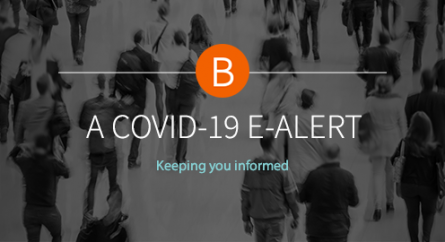CARES Act Temporary Rule for Paid Sick Leave and Expanded FMLA
The Department of Labor has released its temporary rule implementing the Paid Sick Leave (“PSL”) and expanded FMLA (“eFMLA”) provisions of the Families First Coronavirus Relief Act. Some highlights are as follows.
- Definition of Child Care Provider: Almost anyone can be a “Child Care Provider” for purposes of FFCRA leave. The definition includes not only day care centers and group homes, but also individual providers (who need not be licensed, or even compensated, if the provider is a family member, friend, or neighbor who regularly cares for the child). Thus, an employee who relies on a neighbor or friend to provide childcare may be eligible for PSL and eFMLA if the neighbor or friend cannot perform those services due to COVID-19-related reasons.
- Definition of “Telework”: PSL and eFMLA are not available to an employee who is able to telework. An employee can “telework” where:
- The employer has work for the employee to perform;
- The employer permits the employee to work from a location of the employee’s choosing (whether during regular business hours or at other times as agreed by the employer and the employee); and
- No extenuating circumstances exist to prevent the employee from working (such as COVID-19 symptoms)
- Counting Employees: Determining whether an entity has 500 or more employees (and thus is exempt from the statute) requires a count of all full-time and part-time employees in the United States (but not foreign employees), including any employees on leave, but not any employees who have been laid off or furloughed and not re-hired. It is unclear from this definition whether an employee on current furlough status (that is, out of work but still an employee and subject to recall) must be counted.
- Exempting Employers with 50 or Fewer Employees: The DOL has provided three potential criteria for smaller employers—those with 50 or fewer employees—to deny otherwise eligible employees leave under the FFCRA. An authorized officer of the business may certify that:
- Providing FFCRA leave will result in expenses and obligations exceeding revenues and cause the business to cease operating;
- The employee’s absence would create a “substantial risk to the financial health or operational capabilities of the business” due to the employee’s knowledge, skill, or responsibilities; or
- If the leave were allowed, the business would not have enough individuals who are ready, willing, and able to work as to allow the business to continue operating.
Smaller employers seeking to deny FFCRA leave must document their decision but need not provide the documentation to the DOL at the time of its decision.
- Maximum of 12 Weeks of eFMLA: The eFMLA provides a total of twelve weeks of leave through December 31, 2020 for COVID-19-related childcare issues, regardless of whether an employee’s leave spans two separate 12-month FMLA measurement periods. For example, if an employee had taken 9 weeks of FMLA leave starting July 1, 2019, the employee would have 3 weeks of eFMLA leave to use until July 1, 2020, when a new 12-month FMLA measuring period begins. If the employee used those 3 weeks of eFMLA now, the employee would have only 9 weeks of eFMLA to use on or after July 1, 2020, even though the employee would have a total of 12 weeks of FMLA leave to use as of that time.
- No Available Work Means No PSL/eFMLA: Employees may not take PSL or eFMLA where the employer has no work for the employee to perform. Thus, according to the regulations, PSL and eFMLA are not to be used as substitutes for layoffs or furloughs.
- Necessity for Childcare Leave: PSL and eFMLA for COVID-19-related childcare reasons may be used “only if no suitable person is available to care for” the employee’s child during the leave. Accordingly, only one parent/guardian at a time may use PSL and eFMLA for childcare purposes. This likely will impact situations where both parents/guardians work for the same employer.
- Exclusion for “Health care providers’ and “emergency responders”: FFCRA provides an exemption that permits, but does not require, employers to deny PSL and/or eFMLA to “health care providers” and “emergency responders.” While the text of the FFCRA seemed to indicate that only those specific employees providing clinical or emergency services would be exempt under this provision, the regulations take a much more expansive view and permit an employer to deny leave to “any employee” of a health care services entity (including administrative staff, custodial staff, etc.). Along with its broad regulatory interpretation, however, the DOL also emphasized that the exemptions are permissive and encouraged employers to be “judicious” in deciding which employees to deny leave to, particularly where granting the leave can help stop the spread of the virus.
- Documentation of Leave: Employees may provide a self-certification of the need for FFCRA leave, providing:
- The employee’s name;
- The dates leave is requested;
- The qualifying reason for the leave;
- An oral or written statement that the employee cannot work because of the qualifying reason;
- The name of the government entity or health care provider who ordered a quarantine or isolation, if applicable;
- The name of the son or daughter for whom the employee must provide care, if applicable;
- The name of the school or other child care provider that is closed or unavailable, if applicable;
- A representation that no other suitable person can provide care for the child, if applicable; and
- Any other information as needed for the employer to claim the payroll tax credit, as the IRS may require (among other things, the IRS is requiring a showing of special circumstances to justify child care leave during daylight hours where the child is age 14 or older).
- Recordkeeping Requirements: Employers must keep all records regarding FFCRA leave for four years, whether the employer granted or denied the leave.
As always, businesses should consult these regulations whenever handling an employee’s request for FFCRA leave.
Categorized: COVID-19 Resources, Employees, Employment, Owning the Brewery, Policies
Tagged In: CARES Act, coronavirus, COVID-19, expanded FMLA, paid sick leave











